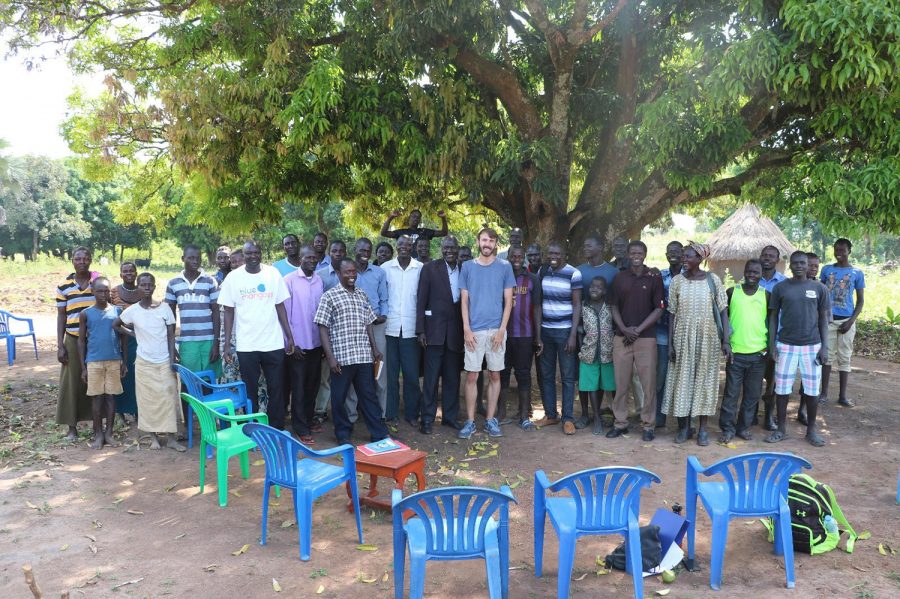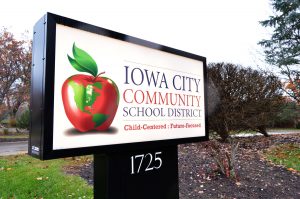Student works with rural farmers in Africa to sell dried mangoes
UI junior Hayden Vest works with rural farmers in Africa to create dried mangoes. The efforts help foster economic development and financial independence.
April 8, 2019
When Hayden Vest traveled across the world to aid farmers in Africa, he realized he was a part of something bigger than himself.
Vest, a junior at the University of Iowa, is part of Blue Mangoes, a social enterprise that works with rural communities to create dehydrators for small-scale mango farmers to produce dried fruit before exporting and selling the product in the U.S.
CEO and founder Joshua Shefner started Blue Mangoes after a project during his freshman year of college. Vest began working with Blue Mangoes after receiving a LinkedIn request from Shefner.
Shefner said he was looking to hire employees in May 2018, and Vest’s major in international relations sparked his interest.
“I’ve always loved international-relations studies,” he said. “I have a really good feeling for what the major is like and what the curriculum is.”
Hesitant about the offer at first, Vest said, he took a chance on the project and grew to love it.
“I was just kind of doing it to do it at first,” Vest said. “And then once I really got going, that’s when I [realized] I love doing this … because I realized that we have the opportunity to help people.”
The experience that helped him realize his passion for the project was a trip to Uganda in November 2018, Vest said.
“That was when I was like, ‘This is exactly what I want,’ ” he said.
After a grueling flight and a 10-hour bus ride to a rural village in northern Uganda, Vest and other Blue Mangoes employees helped the local farmers build fruit dehydrators and taught them how to build and maintain them.
Giving the farmers the skills to build their own dehydrators is one of the vital pieces of Blue Mangoes’ mission, Vest said.
“Even if they don’t use it with us, say our business fails, they can still use the tools that we taught them to better themselves,” Vest said.
Blue Mangoes also focuses its efforts on training women to use the machines, Shefner said.
“When women control their own incomes in communities, there’s a bunch of research that shows more money goes to children,” Shefner said. “Life expectancy of children improves.”
RELATED: MERGE connects creative people, entrepreneurs over coffee
Vest is now the program director for East Africa, managing four employees in Kenya and Uganda. He helps coordinate with partnered organizations, provides the employees with whatever they need, and monitors the projects going on in each country.
Patrick Nditeru, the country director in Kenya for Blue Mangoes, said more than 70 percent of the mangoes produced in Kenya every year go to waste.
“Most of the mangoes are produced by small-scale farmers … from very dry parts of the country, because that is where mangoes grow from,” he said. “These are very vulnerable people economically who do not have anything else that they rely on.”
Nditeru said that with the usual farming methods, the farmers he works with make an average of $70 per month for the household. The dehydrators will help them drastically increase their income.
“From the projections that we’re seeing, for the farmers that we work with, we shall be able to more than triple that income for those households,” he said.
Vest will head back to Africa in May, this time visiting Kenya, Uganda, and Tanzania. The company will check in with the farmers and organizations they work with in Uganda and Kenya, and it will try to set up a presence in Tanzania.
Vest said the experience from traveling around the world with Blue Mangoes has given him a unique perspective on the world.
“Being American, we always paint a picture like we’re so different from everyone else, but we’re really not,” he said. “Everyone wants the same things in life, essentially.”






